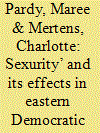| Srl | Item |
| 1 |
ID:
141467


|
|
|
|
|
| Summary/Abstract |
The proportion and visibility of Brazilian women and particularly the specific images of Brazil and Brazilians in the Portuguese imaginary have contributed to the construction of new versions of stigma and stereotypes surrounding them. Mainstream images of Brazilian women have incorporated prejudices about the sensuality of Creole women who are reminiscent of the Portuguese colonial imaginary. Starting from this stigmatised image, we show how Brazilian women entrepreneurs in the ‘beauty’ business filière reinterpret and mobilise this perceived negative image, transforming it into an added value associated with an ‘aesthetic’ Brazilian body culture. This idea of ‘body’ aesthetics becomes a business resource transformed into aesthetic–corporal capital, a key component of the Brazilian beauty business filière. Empirically, this research is based on qualitative elements, in particular 25 interviews with Brazilian women entrepreneurs of the beauty filière working in Portugal, collected for the project BELTS-W (Brazilian Entrepreneurial Links and Transnational Strategies – Women).
|
|
|
|
|
|
|
|
|
|
|
|
|
|
|
|
| 2 |
ID:
152086


|
|
|
|
|
| Summary/Abstract |
Newly recognised as a threat to global peace and security, sexual violence in conflict is now a fixed item on international security agendas. This marks significant progress for women, gender equality and the integrity of peace programmes. Our aim here, however, is to reflect upon the risks that inhere in this accomplishment. Through the concept of ‘sexurity’, a tripartite amalgam of the securitisation of sexual violence, the sexualisation of security, and the language of crisis, we outline the adverse effects of tethering sexual violence to security. This article concerns itself with the material and symbolic effects of ‘sexurity’ for eastern Democratic Republic of Congo (DRC). It first outlines ‘sexurity’ and the context of its emergence before, drawing on fieldwork in eastern DRC, the second part underlines the effects of ‘sexurity’ for the country.
|
|
|
|
|
|
|
|
|
|
|
|
|
|
|
|